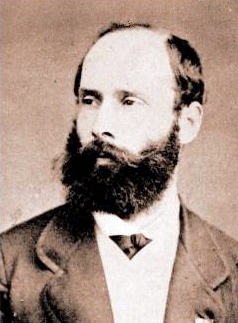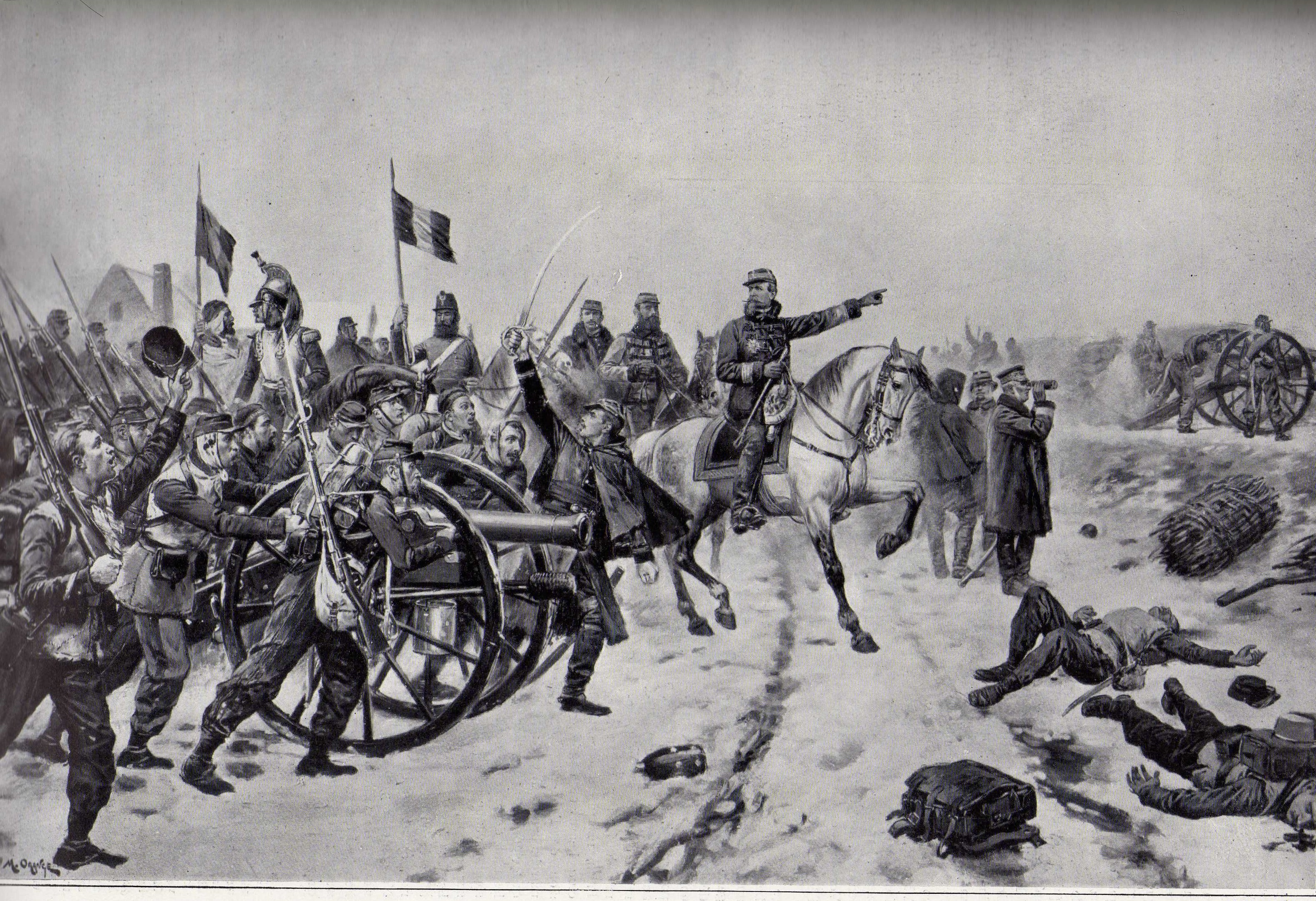Camp Conlie on:
[Wikipedia]
[Google]
[Amazon]
 Camp Conlie was one of eleven military camps established by the Republican
Camp Conlie was one of eleven military camps established by the Republican
 After the defeat of French forces at the
After the defeat of French forces at the
 Gambetta decided to send 12,000 men from camp Conlie, armed with only 4000 badly maintained rifles, against the forces of the
Gambetta decided to send 12,000 men from camp Conlie, armed with only 4000 badly maintained rifles, against the forces of the
 In 1904 it was claimed that the world's first
In 1904 it was claimed that the world's first
 Camp Conlie was one of eleven military camps established by the Republican
Camp Conlie was one of eleven military camps established by the Republican Government of National Defense
The Government of National Defense (french: Gouvernement de la Défense nationale) was the first government of the Third Republic of France from 4 September 1870 to 13 February 1871 during the Franco-Prussian War. It was formed after the proclam ...
under Léon Gambetta
Léon Gambetta (; 2 April 1838 – 31 December 1882) was a French lawyer and republican politician who proclaimed the French Third Republic in 1870 and played a prominent role in its early government.
Early life and education
Born in Cahors, Ga ...
during the Franco-Prussian war. It became notable because of events which have led to its being described as a "concentration camp
Internment is the imprisonment of people, commonly in large groups, without charges or intent to file charges. The term is especially used for the confinement "of enemy citizens in wartime or of terrorism suspects". Thus, while it can simpl ...
", in which troops from Brittany
Brittany (; french: link=no, Bretagne ; br, Breizh, or ; Gallo: ''Bertaèyn'' ) is a peninsula, historical country and cultural area in the west of modern France, covering the western part of what was known as Armorica during the period ...
were supposedly incarcerated and persecuted. This became a significant atrocity story
Atrocity propaganda is the spreading of information about the crimes committed by an enemy, which can be factual, but often includes or features deliberate fabrications or exaggerations. This can involve photographs, videos, illustrations, intervie ...
within Breton nationalism
Breton nationalism (Breton language, Breton: ''roadelouriezh Brezhoneg'', French language, French: ''nationalisme Breton'') is a form of Territorial nationalism, regional nationalism associated with the region of Brittany in France. The politic ...
.
Background
 After the defeat of French forces at the
After the defeat of French forces at the Battle of Sedan
The Battle of Sedan was fought during the Franco-Prussian War from 1 to 2 September 1870. Resulting in the capture of Emperor Napoleon III and over a hundred thousand troops, it effectively decided the war in favour of Prussia and its allies, ...
, and the fall of the monarchy of Napoleon III
Napoleon III (Charles Louis Napoléon Bonaparte; 20 April 18089 January 1873) was the first President of France (as Louis-Napoléon Bonaparte) from 1848 to 1852 and the last monarch of France as Emperor of the French from 1852 to 1870. A nephew ...
, a new republic was proclaimed. The new government decided to form a new army and continue the war. Major General Émile de Kératry
Comte Émile de Kératry (24 March 1832, Paris — 6 April 1904, Paris) was a French politician, soldier and author, the son of Auguste Hilarion (old noble Breton family).
Kératry became deputy for Finistère in 1869, and strongly supported t ...
was made responsible for establishing a camp at Conlie in the region of Le Mans and mobilized volunteers from the west of France to form an "army of Brittany". The mobilized quota from the five departments of Brittany was 80,000 men. It was intended that these troops would be equipped with the weapons left over from the American Civil War
The American Civil War (April 12, 1861 – May 26, 1865; also known by other names) was a civil war in the United States. It was fought between the Union ("the North") and the Confederacy ("the South"), the latter formed by states ...
, but these promised weapons failed to materialize.
Because of a history of anti-republicanism in Brittany, Gambetta doubted the reliability of these troops, and Kératry was suspected of separatist inclinations.
The huts were not built when the soldiers arrived. In consequence, they were housed in emergency tents. Bad weather and the recently ploughed land quickly created a quagmire in which it was difficult to move. A lack of instructors, equipment and supplies caused frustration. Disease caused significant mortality.
Rumours
Rumours about the camp began to circulate in Brittany. As visiting English journalist Ernest Vizetelly noted,The most appalling rumours were current throughout Brittany regarding the new camp. It was said to be grossly mismanaged and a hotbed of disease. I visited it and prepared an article which was printed by the ''Daily News ''...So far as the camp's defences and the arming of the men within it were concerned my strictures were fully justified.Ernest Alfred Vizetelly, ''My Days of Adventure'', BiblioBazaar, 2007, p. 180-2Nevertheless, Vizetelly argued that poor conditions, though real, were explicable,
The critics of the camp have said that the spot was very damp and muddy, and therefore necessarily unhealthy, and there is truth in that assertion; but the same might be remarked of all the camps of the period, notably that of D'Aurelle de Paladines in front of Orleans. Moreover, when a week's snow was followed by a fortnight's thaw, matters could scarcely be different. From first to last (November 12 to January 7) 1942 cases of illness were treated in the five ambulances of the camp. Among them were 264 cases of small-pox. There were a great many instances of bronchitis and kindred affections, but not many of dysentery. Among the small-pox cases 88 proved fatal. I find on referring to documents of the period that on November 23, the day before Gambetta visited the camp, as I shall presently relate, the total effective was 665 officers with 23,881 men. By December 5 (although a marching division of about 12,000 men had then left for the front) the effective had risen to 1241 officers with about 40,000 men. There were 40 guns for the defence of the camp, and some 50 field-pieces of various types, often, however, without carriages and almost invariably without teams. At no time, I find, were there more than 360 horses and fifty mules in the camp. There was also a great scarcity of ammunition for the guns.
Battles
 Gambetta decided to send 12,000 men from camp Conlie, armed with only 4000 badly maintained rifles, against the forces of the
Gambetta decided to send 12,000 men from camp Conlie, armed with only 4000 badly maintained rifles, against the forces of the Duke of Mecklenburg
This list of dukes and grand dukes of Mecklenburg dates from the origins of the German princely state of Mecklenburg's royal house in the High Middle Ages to the monarchy's abolition at the end of World War I. Strictly speaking, Mecklenburg's p ...
. Given the repeated refusal of the Government to properly arm his men, Kératry resigned in protest on November 27, leaving the command to his deputy, General Le Bouëdec. General Marivault, who succeeded him, called, from December 10, for the partial evacuation of the camp, because of the poor conditions. This was denied by Gambetta, who visited the camp, declaring the situation to be excellent. The General Staff were evacuated. Gambetta eventually agreed to evacuate the camp at the end of December, at the insistence of General Freycinet.
The remaining 19,000 troops were incorporated into the 2nd Army of the Loire, and the camp was closed on January 7, 1871. On the eve of the Battle of Le Mans
The Battle of Le Mans was a German victory during the Franco-Prussian War that ended French resistance in western France.
Background
After capturing the armies of the French Empire at Sedan and Metz in the fall of 1870, the German armies un ...
(10 and 11 January 1871), these 19,000 troops were sent to the front line, bearing poor quality arms. The French army, led by Antoine Chanzy, was crushed by the Prussians. Chanzy blamed the Breton troops.
The Prussians reached Camp Conlie on January 14. French defenders blew up the fortifications and retreated from the town on March 6.
Effects
From November 1870 to January 1871 there were 143 deaths from disease including 88 of smallpox. 2000 of the soldiers had to be sent to the infirmary. The report of a commission of inquiry prepared by Breton historianArthur de La Borderie
Arthur Le Moyne de La Borderie, (5 October 1827, Vitré, Ille-et-Vilaine – 17 February 1901, Vitré) was a Breton historian, regarded as a father of Brittany's historiography.
Life
He came from ''La Borderie'', which was an estate in the comm ...
was overwhelmingly critical of the French army, which demonstrated a total lack of organization.
The Camp Conlie affair raised general indignation in Brittany. The camp was not a "concentration camp" (the term was invented some twenty years later and the supposed "detainees" were volunteers under military instruction, even if they were neither equipped, trained, or armed), but it is perceived as such in the collective unconscious of many Breton nationalists. A monument was inaugurated on May 11, 1913 on the hill of the Jaunelière. A commemorative plaque was affixed on February 14, 1971 during the centennial.
Earliest picture postcard
 In 1904 it was claimed that the world's first
In 1904 it was claimed that the world's first picture postcard
A postcard or post card is a piece of thick paper or thin cardboard, typically rectangular, intended for writing and mailing without an envelope. Non-rectangular shapes may also be used but are rare. There are novelty exceptions, such as wood ...
had been created at Camp Conlie. After publicity following the death of the German entrepreneur who claimed have invented them, Léon Besnardeau (1829–1914) announced that the first cards had been created by him for soldiers in the camp to communicate with relatives. They had a lithographed design printed on them containing emblematic images of piles of armaments on either side of a scroll topped by the arms of the Duchy of Brittany
The Duchy of Brittany ( br, Dugelezh Breizh, ; french: Duché de Bretagne) was a medieval feudal state that existed between approximately 939 and 1547. Its territory covered the northwestern peninsula of Europe, bordered by the Atlantic Ocean t ...
and the inscription "War of 1870. Conlie camp. Souvenir of the National Defence. Brittany Army". While these are certainly the first known picture postcards, there was no space for stamps and no evidence that they were ever posted without envelopes.http://www.cartolis.org/histoire.php ''Histoire de la Carte Postale'', Cartopole, Baud.
References
Bibliography
*Yann Brekilien, ''L'holocauste breton'', Editions du Rocher, 1994, , *Philippe Le Moing-Kerrand, ''Les bretons dans la guerre de 1870'', 1999, *Hervé Martin, Louis Martin, ''Le Finistère face à la modernité entre 1850 et 1900'', 2004, Apogée, *Jean Sibenaler, "Conlie, Les soldats oubliés de l'armée de Bretagne", éditions Cheminements, 2007 {{coord, 48, 09, 16, N, 0, 02, 40, W, type:landmark_source:kolossus-frwiki, display=title History of Brittany Breton nationalism Military history of Brittany History of Sarthe